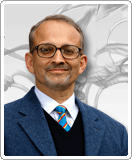Asad Ali Abidi - Back to the Future
Tuesday, 23 December 2008 05:41
 IEEE Fellow returns to Pakistan to open tech university
IEEE Fellow returns to Pakistan to open tech university
As a high school senior, Asad Abidi found himself at a crossroads. Torn between physics and electrical engineering, he stood at the entrance of his school asking science teachers which they thought offered more exciting opportunities. Engineering was the overwhelming response, so that’s what he went to university to study.
“It was the toss of a coin,” says Abidi, who was born and raised in Pakistan and moved to England at 16. “But I loved engineering completely.” Asad studied at Cadet College Hasanabdal and was from the 15th Entry (1968-1973).
The coin has been paying dividends ever since. Some three decades later, Abidi, 52, has carved out an enviable career transforming the wireless communications industry, first as a Bell Labs researcher and then as an electrical engineering professor at the University of California, Los Angeles (UCLA). Along the way, the IEEE Fellow garnered numerous accolades, including the 2008 IEEE Donald O. Pederson Award and election to the National Academy of Engineering, U.S. engineering’s highest honor. So what does Abidi do for an encore? He goes back to his roots.
In August 2007, he left his UCLA post of 22 years to return to Pakistan for a three-year stint as the first dean of the new School of Science and Engineering (SSE) at the Lahore University of Management Sciences (LUMS). There he is overseeing the school’s transition to what is hoped will be a world-class interdisciplinary facility that will introduce a culture of research and entrepreneurship to a new generation of engineering and science students. Some 8000 applicants are vying for 200 slots in SSE’s first class this fall, many of them students already accepted by the likes of Caltech, MIT, and Stanford but who lack money for tuition. The school is privately funded, so it avoids government interference.
SSE is part of a plan to transform Pakistan’s economy by nurturing technological innovation by its citizens. LUMS, regarded as one of Asia’s top 20 business schools, wanted to create a science and engineering program that did more than churn out graduates who, because of a lack of research facilities and guidance, were well trained in existing technologies but not in innovation, Abidi says.
CREATIVITY A MUST “The economy here is in very poor shape, and it’s not enough to produce a new generation of business leaders,” Abidi says. “The country needs people to create new products and technologies—which it can’t do without a research culture.” Collaboration with the business school would prepare the engineering students to turn new technology to commercial use. In the past, students wanting a research career have had to leave the country.
Abidi earned a bachelor’s degree from Imperial College London and master’s and doctoral degrees from the University of California, Berkeley, all in electrical engineering. While in college, Abidi chanced upon IEEE through its publications, becoming a student member in 1974. He served on several IEEE committees, and he helped establish the Solid-State Circuits Society and edited its IEEE Journal of Solid-State Circuits.
“IEEE has such a strong international presence,” he says. “There are three chapters in Lahore alone, and I’ve been to IEEE seminars in places as far-flung as Bangalore and Brazil.”
Graduating in 1981, he worked in the Advanced LSI Development Laboratory at Bell Laboratories in Murray Hill, N.J., before joining the UCLA faculty in 1985. He spent 1989 as a visiting faculty researcher at Hewlett-Packard Laboratories in Palo Alto, Calif.
At UCLA, Abidi and his colleagues pioneered the study of and research in the field of integrated circuits and systems. His research focused on developing circuits in complementary metal-oxide-semiconductor (CMOS) technology, used to fabricate microprocessors and digital signal processors for most of today’s wireless communications. Without such circuits, “the wireless industry would have taken much longer to develop,” Abidi says. By 2007, about the time he began wondering how next to apply his talents, he got the offer to lead SSE (http://sse.lums.edu.pk/interview_deanabidi.htm).
“I asked myself if what I was doing was a complete fulfillment of my life. Could I contribute in another way?” he says. “What better way to do it than to return to the country of my birth—which is still so needy—and continue my work shaping a new generation of engineers.”
Article by Susan Karlin
Asad Ali Abidi - Related Links
Wikipedia
IEEE